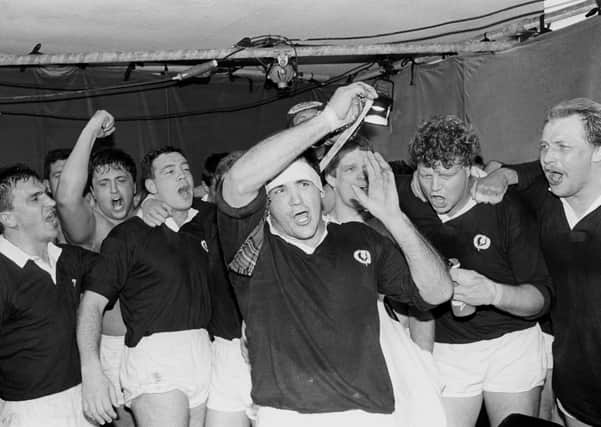Allan Massie: It was all about heart as Scotland claimed their Grand Slam victories


Winning the Grand Slam means you are the best team in Europe. No question about it. You can’t argue with the figures and the final table. You’ve beaten everyone else. Nobody can take that away from you, even if the final result was surprising at the time.
This was certainly the case in both 1984 and 1990. In both years, both teams came to the last round with a Grand Slam in their sights. This is unusual. In 1980, for instance, when Bill Beaumont’s team came to Murrayfield and won England’s first Grand Slam since 1957, Scotland were out of the reckoning even for the Championship, having lost in both Dublin and Cardiff. There was another thing unusual in 1984 and 1990. The visitors started as favourites.
Advertisement
Hide AdAdvertisement
Hide AdIn 1984 Scotland had clinched the Triple Crown in fine style in Dublin, but France had demolished England at Parc des Princes, scoring five tries to two. Their team was full of stars: the captain Jean-Pierre Rives. Serge Blanco, Philippe Sella, Didier Codorniou, Jerome Gallion, Philippe Dintrans, Daniel Dubroca. Looking at the team-sheets and the players’ clubs invites nostalgia. Six of the seven Border League clubs were represented in the Scotland XV, only Langholm missing out. In the French XV one sees the names of famous clubs that have dropped out of the top flight in these days of big-money professionalism: Dax, Narbonne, Tarbes, Biarritz and Lourdes.
For the first half-hour at least France looked the likely winners. They were dangerous and dominant, Scotland forced to defend heroically. Yet France scored only one try and just before the interval Scotland began to come into the game, thanks initially to some powerful surges by David Leslie, most intrepid of flankers. Scotland gradually seized control in the second half. French discipline frayed. Peter Dods of Gala kicked penalties. Then John Rutherford’s Garryowen under the posts was fumbled. Scotland pressed. A line-out led to a French knock-on. The ball landed in Jim Calder’s arms, and he dived over the try-line. “Just my distance” he would say modestly. Dods converted and kicked another penalty. 21-12 and the end.
It had been hard slogging, with little of the brilliance of each team’s previous match. A couple of hours afterwards I encountered Bill Dickinson, Scotland’s first official coach, on the Waverley Steps. Bill was seldom a man of few words, but all he could say was “heart, it was just heart”.
Heart was needed in 1990 too. Almost everyone who cares to read this column will have seen replays of this historic match, or at least its highlights. Thousands have played it over and over again in their mind’s eye. It was certainly extraordinary.
The previous rounds of the tournament had made it clear that England were a superb team, Scotland a pretty good one.The results are worth listing. Scotland had beaten Ireland 13-10, France 21-0 ( a game in which a French forward was sent off early in the second half) and Wales 13-9. These were commendable results, for we have never found it easy to win in Dublin and Cardiff. England’s record was, however, much more impressive. They had beaten Ireland 23-0, France, in Paris, 26-7, and Wales 34-6. They had a formidable pack and a magnificent back division in which Rob Andrew, Jeremy Guscott and Rory Underwood were the stars. Underwood had scored four tries in these three games; Scotland had scored a total of five in theirs, and it couldn’t be said that any of Scotland’s matches had been of high quality. No wonder England were favourites.
Later, some said they had been over-confident, believing they had only to turn up to win. I doubt if this was the case. After all, the previous year’s Calcutta Cup at Twickenham had ended in a draw, 12-12, and they had won only 9-6 at Murrayfield in 1988, a match of penalties only and rivalled only by the infamous Welsh match of 111 line-outs in 1963 as the most boring international I have watched at Murrayfield.
Scotland began well as they had to, Finlay Calder, supported by the pack, driving deep into the English defence, and young Craig Chalmers kicking a couple of penalties. England gathered themselves and Guscott scored a well-worked try. Then came a crucial moment. England had a scrum five metres from the Scottish try-line. It collapsed. Penalty. They scrummed again and again. Should they have gone for goal? Probably. Should the referee, a New Zealander, have awarded a penalty try? Perhaps. But he didn’t and Scotland escaped.Then, immediately in the second half came Tony Stanger’s try, now as famous as any in Scottish rugby history, and later there was a tackle now equally famous, by Scott Hastings on Rory Underwood, just as the flying winger seemed about to break clear and score. Then there was unrelenting English pressure, but Scotland held on, and indeed never seemed likely to give way.
So a famous victory,the most famous of victories. Were we lucky? Perhaps. In the days of TMOs Stanger’s try might, as Jim Telfer has admitted, have been disallowed. But happily there was no thought of video evidence then.
In any case it was the right result. It would be ten years before we beat England again, though there were two matches in that time we should have won.